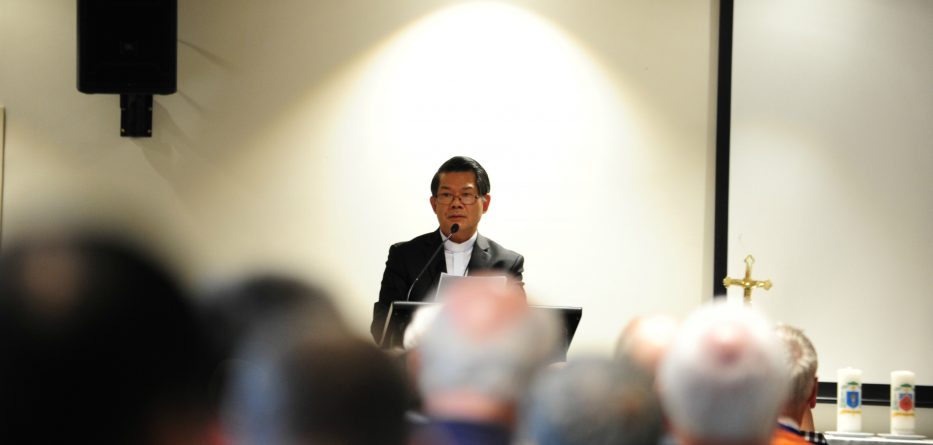Most Reverend Vincent Long Van Nguyen OFM Conv DD STL, Bishop of Parramatta
Homily for the 28th Sunday in Ordinary Time in Year B 2018 at St Patrick’s Cathedral, Parramatta
Readings: Wisdom 7:7-11; Hebrews 4:12-13; Mark 10:17-30
14 October 2018
Sisters and brothers,
It is always hard to let go of something – or even harder – someone that has been much a part of our lives. That is so because it is in our human nature to cling on what is familiar, comfortable, secure and to resist what might disturb or upset the existing order and the status quo.
My life – perhaps like yours – has been marked by a lot of changes, some of which were quite dramatic. Uprooting from home at the age of 12 was one such experience. I remember the sound of the alarm siren at 4am that woke me up everyday and heralded a rather rigorous, almost military-like schedule of activities. I really missed mum’s tenderness as opposed to the regimented life in the minor seminary.
Then, there was the experience of being a boat person and a refugee, which brought about even more traumatic changes. God seems to have pushed me further and further away from my little comfortable and familiar world. I have been led to new horizons, often times against my will.
I love that song that says: “So I leave my boats behind, leaving them on familiar shores. Set my heart upon the deep. Follow you again my Lord.”
In hindsight, I am deeply grateful for the new horizons I have been led to. When we are open to change, to new horizons and possibilities, new pathways and experiences, life can be revitalised, enhanced and enriched.
On the other hand, when we stubbornly refuse to let go of the things that hold us back; when we are attached to things that hinder us from growing, then we are in danger of being stifled and stagnated.
This is what happened to the rich young man in the Gospel story. On the face of it, he was a good and honourable man. He ticked all boxes. He kept all the commandments. He did not steal. He did not cheat. He did not lie. He did not harm anyone. He honoured his father and mother. He was a dream child, right?
Well, not as far as the Gospel was concerned! When Jesus challenged him to go home and sell his possessions, give the money to the poor and follow him, this young man revealed his true colours. He could not part with his wealth and security. He could not accept the radical demands of discipleship. He walked away sad and disappointed because he was too attached to his status as a man of riches and power.
Jesus felt deeply sorry for him because the young man had missed the opportunity to outgrow himself. He had chosen his comfort zone and self-interest; he had refused the invitation of Jesus to experience an alternative mode of existence – one that is based on trust and shared life rather than accumulation and personal security. He was like that older brother in the Parable of the Prodigal Son. His religious observance was only a façade. Scratch the surface of both the elder brother and the rich young man in today’s Gospel, we find a stifled, stagnated and small-hearted person.
Dear friends,
“It is easier for a camel to pass through the eye of a needle than for a rich person to enter the kingdom of God.” The Word of God today lays bare the radical demands of Christian discipleship. Jesus makes it clear that following him has little to do with doing the minimum and fulfilling the letter of the law. Instead, it has to do with an alternative mode of existence where we prioritise the common good instead of self-interest.
In the world in which people amass wealth and place personal security as number one priority, the Christians are called to negotiate between survival orientation and vulnerability, accumulation and distributive justice.
This was what the early Christian community did. They abandoned the default position of self-interest and embraced radical communion. They shared their possessions and made sure that no one was left behind. They formed an intentional community of sharing in common with each other and looking after the most vulnerable.
This is what acting by the wisdom of God looks like. The teaching and example of Jesus inspire us to take a stand for the weak, vulnerable and marginalised.
Discipleship is a journey that demands courage because it forces us to abandon security in favour of vulnerable trust, self-interest in favour of passion for justice and preferential option for God’s poor.
Let us pray that we have the courage to live our discipleship without counting the costs. May the teaching and example of Jesus guide us as we endeavour to build relationships and communities that mirror the Reign of God.
May our response to his daily invitation and the prompting of his Spirit be marked with generosity, trust and passion.








